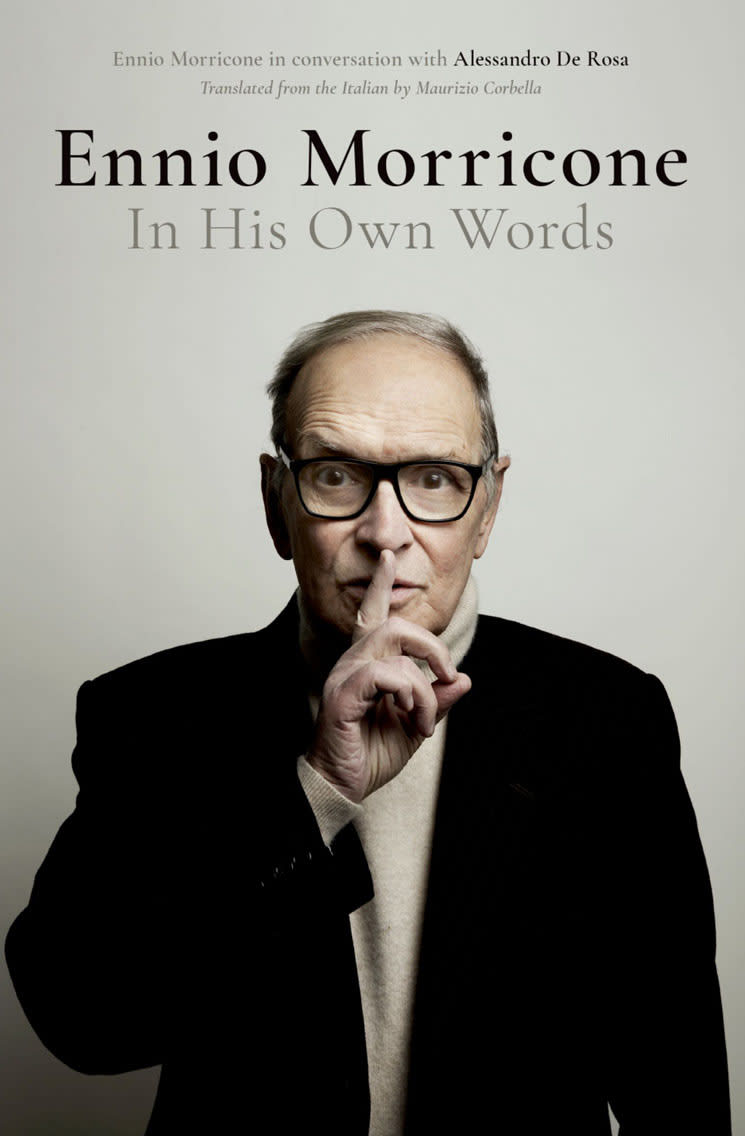The oscillating trill and dampered wahs of Ennio Morricone's iconic theme to Sergio Leone's genre-defining spaghetti western The Good, The Bad and The Ugly were enough to solidify the composer as one of his generation's best, but there's far, far more to him than that. Ennio Morricone: In His Own Words comes close to touching on it all, offering a vivid portrayal of the composer as presented in what appears to be a single conversation with 34-year-old composer Alessandro De Rosa.
Going beyond a typical biography, De Rosa spends just as much time dissecting Morricone's ethos and philosophy as he does his past, depicting the composer as an uncompromising figure in the face of technological and social change. Instead of simply recounting Morricone's extensive career chronologically, De Rosa has divided his conversation with Morricone into four main parts, ranging from the historical to the purely theoretical (including Morricone's views on the nature of craftsmanship and the relationship between music and other media). Condensing Morricone's 70-year career into a single volume, it's dense, and understandably so.
The beginning is a dizzying stream of names, mostly older Italian filmmakers and composers unknown to a North American audience. But once you get through to more thematic chapters, the universality of Morricone's expertise begins to shine through. Once Morricone and de Rosa move beyond recounting Morricone's early history, the broad strokes of his oeuvre allow for deeper observations to emerge. Though the book risks its appeal to a mainstream audience with its lengthy examinations of the minutiae of tonality, timbre and musical philosophy, it's at its best when orienting Morricone's career in the grander scheme of music's role in pop culture at large, particularly in terms of the score's relationship with film.
A lengthy overview of Morricone's storied career, the book compiles all his best factoids and musings in one convenient volume, with plenty to pique the interests of even his most die-hard fans. Though a difficult entry point for those without extensive knowledge of Italian filmmakers, composers and music theory, the book's natural, conversational rhythm is a guiding force for its massive scope, distilling the legendary composer into a series of highlights for a veritable crash course on one of Italian cinema's most recognizable names.
(Oxford University Press)Going beyond a typical biography, De Rosa spends just as much time dissecting Morricone's ethos and philosophy as he does his past, depicting the composer as an uncompromising figure in the face of technological and social change. Instead of simply recounting Morricone's extensive career chronologically, De Rosa has divided his conversation with Morricone into four main parts, ranging from the historical to the purely theoretical (including Morricone's views on the nature of craftsmanship and the relationship between music and other media). Condensing Morricone's 70-year career into a single volume, it's dense, and understandably so.
The beginning is a dizzying stream of names, mostly older Italian filmmakers and composers unknown to a North American audience. But once you get through to more thematic chapters, the universality of Morricone's expertise begins to shine through. Once Morricone and de Rosa move beyond recounting Morricone's early history, the broad strokes of his oeuvre allow for deeper observations to emerge. Though the book risks its appeal to a mainstream audience with its lengthy examinations of the minutiae of tonality, timbre and musical philosophy, it's at its best when orienting Morricone's career in the grander scheme of music's role in pop culture at large, particularly in terms of the score's relationship with film.
A lengthy overview of Morricone's storied career, the book compiles all his best factoids and musings in one convenient volume, with plenty to pique the interests of even his most die-hard fans. Though a difficult entry point for those without extensive knowledge of Italian filmmakers, composers and music theory, the book's natural, conversational rhythm is a guiding force for its massive scope, distilling the legendary composer into a series of highlights for a veritable crash course on one of Italian cinema's most recognizable names.
